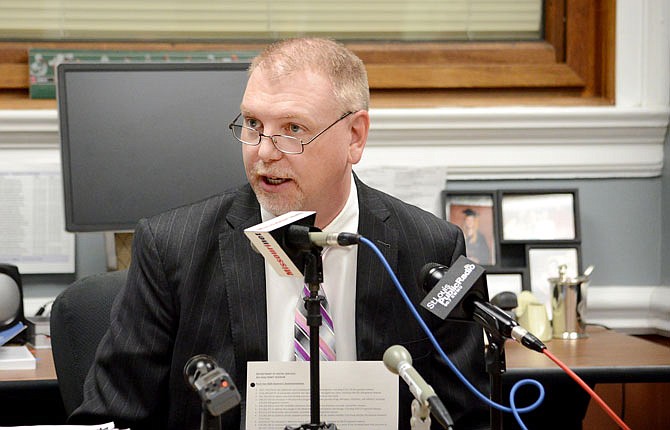The full Missouri Senate is set to consider a supplemental budget bill that would raise wages for state employees after a panel gave it the green light Tuesday.
HB 14, the legislative vessel for Gov. Mike Parson's supplemental budget proposal, which would implement an 8.7 percent cost of living adjustment (COLA) for all state employees -- with the exception of elected officials -- among other funding priorities.
The bill would also up the shift differential -- an extra bump in pay for those working outside of normal business hours -- for congregate care staff within the Department of Social Services (DSS), Department of Corrections (DOC), Department of Mental Health (DMH) and the Missouri Veterans Commission.
The bill would also increase mileage rates for state employees by 10 cents to 65 cents a mile.
The House passed the proposal last week after its budget committee stripped a pay raise for elected officials. The bill passed the Senate Appropriations Committee on Tuesday morning unanimously.
The measure passed unanimously without much discussion, as State Budget Director Dan Haug had walked the committee through the bill during a prior hearing.
"Those are shifts that are very difficult to recruit to right now," Haug said regarding the shift differential. "Currently, I think we're offering a 30 cents an hour shift differential which doesn't really provide much incentive for anybody to work that shift."
Parson said the proposal was a response to high turnover and vacancy rates within state government and called on the General Assembly to pass it to his desk by March 1 to ensure employees saw the change on their paychecks by the end of the month.
While that proposal is making its way through the legislature, state departments are preparing for its implementation. The committee heard from the Department of Agriculture and the Department of Health and Senior Services (DHSS) about their upcoming budgets, and both reported a need for pay increases to bolster their workforces.
Amanda Kelly, budget director for the Department of Agriculture, said the department would require $2.9 million to implement the raise as written in Parson's recommendation, while Marcia Mahaney, director of the Division of Administration for DHSS, said the $10.5 million investment in her department would help stem a growing problem for the department.
"Staffing and vacancies have been a major concern for our department as many others," she said. "Overtime payouts are rising. They were 222,000 in FY 18 and up to 560,000 in FY 22."
Turnover rates have also hit 24 percent, she said, with 240 vacant positions.
Vacancies within the healthcare field could be made up partially through the Primary Care Resource Initiative for Missouri (PRIMO), which addresses the needs of areas of the state that face a shortage of health professionals by providing forgivable student loans and other recruitment incentives in exchange for a commitment that recipients work at a designated facility after completion. The governor's recommendation for the program was $3.3 million for the 2024 fiscal year, around $200,000 more than the legislature appropriated for the program last year.
"These are forgivable student loans and loan forgiveness for healthcare personnel such as primary care physicians, dentists and psychiatrists who agreed to stay in our in work and also with an identified area of the state that has a need," DHSS Division of Community and Public Health Director Lori Brenneke said. "For nurses that are in school, it acts as a scholarship or student loan that, when they graduate, they have to pay by staying in the state and serving in a shortage area, or else it becomes a financial loan from us."
The program requires one year of service in one of these areas per award with a maximum obligation of five years. The department is leading with an emphasis on underserved or rural areas, according to the recommendation.
Those budget items will be considered by lawmakers later in the budget process.
HB 14 also covers school safety upgrades, disaster relief funds and retirement programs, among other priorities. It totals $627 million and is the first of two supplemental appropriation bills this session.
HB 14: Appropriation bill
Sponsor: Rep. Cody Smith

